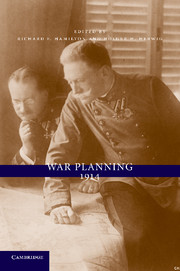Book contents
- Frontmatter
- Contents
- List of Maps
- Contributors
- Acknowledgments
- 1 War Planning: Obvious Needs, Not So Obvious Solutions
- 2 Austria-Hungary
- 3 German War Plans
- 4 War Planning and Initial Operations in the Russian Context
- 5 France
- 6 Great Britain
- 7 Italy
- 8 Conclusions
- Appendix: Suggested Reading
- Index
- References
1 - War Planning: Obvious Needs, Not So Obvious Solutions
Published online by Cambridge University Press: 27 January 2010
- Frontmatter
- Contents
- List of Maps
- Contributors
- Acknowledgments
- 1 War Planning: Obvious Needs, Not So Obvious Solutions
- 2 Austria-Hungary
- 3 German War Plans
- 4 War Planning and Initial Operations in the Russian Context
- 5 France
- 6 Great Britain
- 7 Italy
- 8 Conclusions
- Appendix: Suggested Reading
- Index
- References
Summary
Wars are curious, puzzling, problematic events. Sensible people everywhere know that wars can be extremely costly in lives, property, and money. And they know that their outcomes are uncertain. Yet they still happen. Few other human activities have stimulated as much thought as the simple question: Why do wars happen? More often than not, the concern is with specific wars such as World War I, once called the Great War. The basic question: what happened in August 1914? Or, more precisely, why did the leaders of Europe's major powers choose war?
A formal answer to that question, something discussed in a previous work, The Origins of World War I, is that in each case a small coterie, the nation's leaders, made the decisions that took the nation to war. Those leadership groups assessed current situations, defined the threats, considered alternatives, and chose war as their most appropriate option, either initiating action or responding to another nation's initiative. In each case, moving a step beyond that formal statement, the participants had specific strategic agendas. Austria-Hungary's leaders were seeking to prevent dissolution of the empire, a threat they sensed as stemming from Serbia's initiatives. Germany's leaders saw the threat of a two-front war with France and Russia arming and becoming ever more dangerous. For Germany's leaders the events of July and August 1914 provided a twofold opportunity, to protect their most valued ally, Austria-Hungary, and to remove the threat posed by the entente powers.
- Type
- Chapter
- Information
- War Planning 1914 , pp. 1 - 23Publisher: Cambridge University PressPrint publication year: 2009



